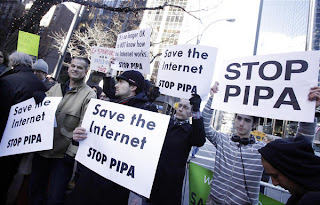As we all know that solar cells are used to convert sun light into electricity. It is generally made of silicon. But the researchers of MIT has invented solar cell which is transparent! Yes, it is transparent and still it can make electricity from sun light.
It is very thin and transparent and it can be applied to the widows of buildings, surface of buildings and in many more applications you could imagine. You would be more surprised to know that this can be available at very low cost than traditional solar panels.
It is very thin and transparent and it can be applied to the widows of buildings, surface of buildings and in many more applications you could imagine. You would be more surprised to know that this can be available at very low cost than traditional solar panels.
 |
| Researcher Richard Lunt with a prototype. Photo: Geoffrey Supran |
It uses a photovoltaic cell based on organic molecules, which harnesses the energy of infrared light while allowing visible light to pass through. This way it generates power while being transparent.
The previous version of transparent solar cells failed because of their low efficiency and their low transparency. But the researcher at MIT(Massachusetts Institute of Technology), Richard Lunt said that this invention has relatively more efficiency and transparency than previous version of transparent solar cell.
However there are many difficulties to face for this invention to be commercially successful. The researchers are trying to make its lifetime upto minimum 25 years.
The efficiency of transparent solar cells is 20% of the traditional solar cells. But still it can be used where the traditional solar cells can’t be used. It can be used in huge sky scrapers where they have very large surface area. Thus it can generate a good amount of energy needed for sky scrapers.
The installation process of this is very easy as an average person can install it on his own. However for commercial success, the windows manufacturers are aiming to ensemble transparent solar cells into windows during manufacturing process.
The previous version of transparent solar cells failed because of their low efficiency and their low transparency. But the researcher at MIT(Massachusetts Institute of Technology), Richard Lunt said that this invention has relatively more efficiency and transparency than previous version of transparent solar cell.
However there are many difficulties to face for this invention to be commercially successful. The researchers are trying to make its lifetime upto minimum 25 years.
The efficiency of transparent solar cells is 20% of the traditional solar cells. But still it can be used where the traditional solar cells can’t be used. It can be used in huge sky scrapers where they have very large surface area. Thus it can generate a good amount of energy needed for sky scrapers.
The installation process of this is very easy as an average person can install it on his own. However for commercial success, the windows manufacturers are aiming to ensemble transparent solar cells into windows during manufacturing process.
 |
| Prototype of transparent solar cells can be seen on top of the banner at 150th anniversary of MIT. Photo: Geoffrey Supran. |





